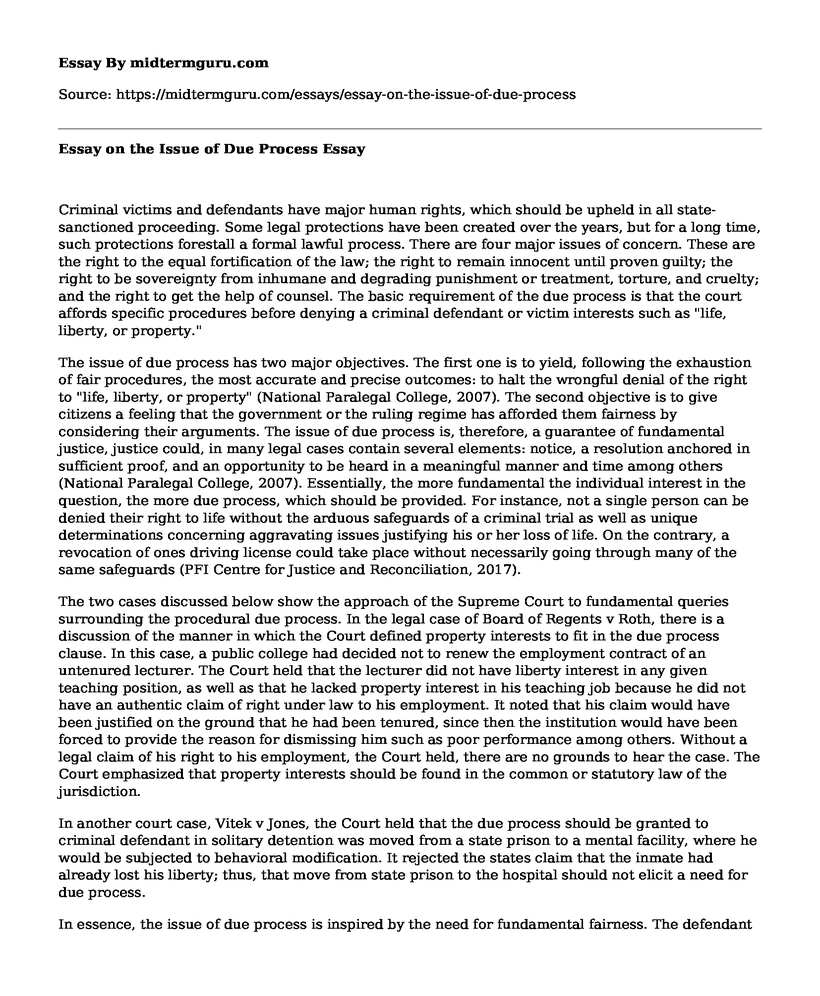Criminal victims and defendants have major human rights, which should be upheld in all state-sanctioned proceeding. Some legal protections have been created over the years, but for a long time, such protections forestall a formal lawful process. There are four major issues of concern. These are the right to the equal fortification of the law; the right to remain innocent until proven guilty; the right to be sovereignty from inhumane and degrading punishment or treatment, torture, and cruelty; and the right to get the help of counsel. The basic requirement of the due process is that the court affords specific procedures before denying a criminal defendant or victim interests such as "life, liberty, or property."
The issue of due process has two major objectives. The first one is to yield, following the exhaustion of fair procedures, the most accurate and precise outcomes: to halt the wrongful denial of the right to "life, liberty, or property" (National Paralegal College, 2007). The second objective is to give citizens a feeling that the government or the ruling regime has afforded them fairness by considering their arguments. The issue of due process is, therefore, a guarantee of fundamental justice, justice could, in many legal cases contain several elements: notice, a resolution anchored in sufficient proof, and an opportunity to be heard in a meaningful manner and time among others (National Paralegal College, 2007). Essentially, the more fundamental the individual interest in the question, the more due process, which should be provided. For instance, not a single person can be denied their right to life without the arduous safeguards of a criminal trial as well as unique determinations concerning aggravating issues justifying his or her loss of life. On the contrary, a revocation of ones driving license could take place without necessarily going through many of the same safeguards (PFI Centre for Justice and Reconciliation, 2017).
The two cases discussed below show the approach of the Supreme Court to fundamental queries surrounding the procedural due process. In the legal case of Board of Regents v Roth, there is a discussion of the manner in which the Court defined property interests to fit in the due process clause. In this case, a public college had decided not to renew the employment contract of an untenured lecturer. The Court held that the lecturer did not have liberty interest in any given teaching position, as well as that he lacked property interest in his teaching job because he did not have an authentic claim of right under law to his employment. It noted that his claim would have been justified on the ground that he had been tenured, since then the institution would have been forced to provide the reason for dismissing him such as poor performance among others. Without a legal claim of his right to his employment, the Court held, there are no grounds to hear the case. The Court emphasized that property interests should be found in the common or statutory law of the jurisdiction.
In another court case, Vitek v Jones, the Court held that the due process should be granted to criminal defendant in solitary detention was moved from a state prison to a mental facility, where he would be subjected to behavioral modification. It rejected the states claim that the inmate had already lost his liberty; thus, that move from state prison to the hospital should not elicit a need for due process.
In essence, the issue of due process is inspired by the need for fundamental fairness. The defendant must be supplied with the notice of the charges against them. They must also be shown that there is articulated standard of conduct that one is alleged to have violated. Further, the hearing should be done within a meaningful time and manner. Lastly, for an accused person to be denied his liberty or property, the court must establish that there is a significant and reliable evidence in support of its charges (PFI Centre for Justice and Reconciliation, 2017).
References
BIBLIOGRAPHY National Paralegal College. (2007). Substantive Due Process - Fundamental Rights. Constitutional and Legal Procedures, 1-1.
PFI Centre for Justicea nd Reconciliation. (2017). Due Process Issues . Justicia Restaurativa, 1-1.
Cite this page
Essay on the Issue of Due Process. (2021, Jul 02). Retrieved from https://midtermguru.com/essays/essay-on-the-issue-of-due-process
If you are the original author of this essay and no longer wish to have it published on the midtermguru.com website, please click below to request its removal:
- A Letter of Inquiry to the Ex-Husband With a Request to See the Children
- Why Some Hackers Are Successful in Phishing - Paper Example
- Mass Incarceration: U.S. Leads World in Prison Population - Essay Sample
- Midtown Community Court: Addressing Social Issues in NYC - Research Paper
- Probation: A Way to Ensure Criminal Justice - Essay Sample
- US Court Calendar & Docket Cases: A Brief Overview - Essay Sample
- Fighting Cybercrime: Overcoming the Law's Enforcement Gap - Essay Sample







